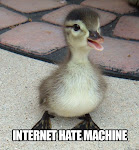I have terrific news! No… wait. That’s not right. What’s the opposite of terrific? Oh that’s right, terrible. I have terrible news! We’re all doomed; every one of us! You’re doomed, your puppy is doomed, your siblings are doomed, and your auntie is doomed. Fear for the future, my friends.
The last time Yellowstone Supervolcano in Wyoming erupted, it wiped out an entire mountain range. That is absolutely terrifying. Granted, that was 640 000 years ago, but the Yellowstone Caldera is by no means dead. It is only a matter of time until it goes boom again. The last Yellowstone eruption pumped more than 240 cubic miles of dust and rock out into the atmosphere and spewed out eight thousand times more ash and lava than the St. Helens eruption in 1980. The effects of that, at least on humans, would be totally unprecedented. In other words: we are done for.
You could say, “that was so long ago. [Older than your grandma. Woah.] Surely there can’t be any chance of it blowing its top again?” Well, smartypants, we do not know whether it will erupt in the same way again, but we do know that the Caldera is swelling. The ground in the area has risen more than a meter over the last century. It has been moving about seven centimetres per year. On a geologic timescale, that is wicked fast. We may not know whether or not it’ll blow, but we do know there isn’t any reason it won’t.
A volcanic eruption is not the only hazard Yellowstone offers us. No, there is more. Most people are familiar with Old Faithful, Yellowstone’s most famous geyser, but not many of these people spend too much time thinking about what makes it tick. Well, guess what? It is going to kill you. Well, maybe not you, specifically, but it’s going to cause mass devastation and mayhem. Pockets of the water system under Yellowstone can sometimes boil to the point where they create massive explosions that hurl water and rock thousands of feet.
Really though, if a massive hydrothermal explosion happened in the middle of Yellowstone, unless you happened to be there on vacation, you’d be unlikely to be affected by it. A volcanic eruption, on the other hand, could wipe out the entire human race if it happened to be large enough. We live fairly near the Yellowstone Caldera (well, on the same continent) and are therefore more likely to die than, say, someone over in Tibet. An eruption would kill at least a few million US citizens. There is no way that wouldn’t impact the economy. Another Great Depression, here we come!
Well, now you know. Does that help you prepare for the coming apocalypse? Not at all. Have fun thinking about the end of the world. Now I’m heading back to my bunker built a mile under my back yard to review my survival plans for when the zombies come.


